Take a deep breath. Now imagine that breath being not just rindoorefreshing but also purified, courtesy of nature’s Natural Air Purifiers. This blog is your guide to natural air purifiers like indoor plants, essential oils, and smart ventilation. Discover how these simple solutions can make the air in your home healthier and more invigorating. It’s time to welcome these natural allies for a fresher living space that’s uniquely yours. From incorporating indoor plants to utilizing essential oils, these simple steps can make a remarkable difference in the air you and your family breathe.
Natural Ways to Improve Indoor Air Quality (IAQ)
Improving the air you breathe indoors doesn’t have to involve complicated gadgets. You can use organic air purifiers like the Himalayan salt air purifier, which is a natural way to clean the air. Activated charcoal air purifiers are another option that’s great at trapping bad stuff in the air. Plus, consider using natural air purifier essential oils to make your indoor air smell lovely. These are all part of the natural remedies for fresher air that you can use to make your home’s air cleaner.
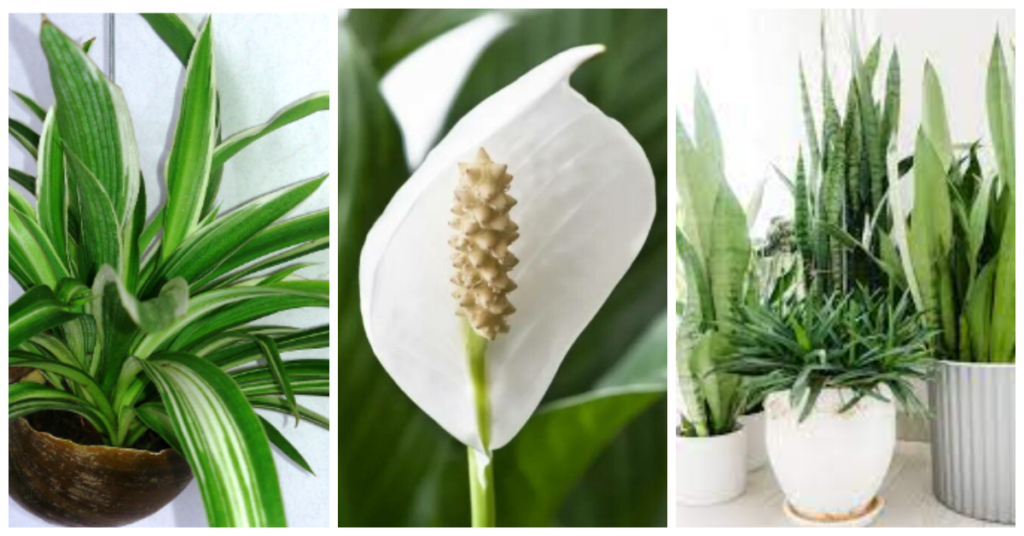
| Natural Ways to Improve Indoor Air Quality (IAQ) | Simple Explanation |
|---|---|
| Indoor Plants | Use air-purifying plants like spider plants, peace lilies and snake plants to naturally clean the air around you. |
| Natural Air Purifiers | Put bamboo charcoal in damp areas to soak up moisture and bad smells. |
| Ventilation | Open windows on opposite sides of your home to let fresh air flow through. |
| Aromatherapy | Mix essential oils and water in a spray bottle to make your own air fresheners. |
| Reducing Pollutants | Pick natural cleaning stuff and keep your place tidy to avoid pollution. |
| Humidity Control | Use machines called dehumidifiers or humidifiers to keep the air at the right level of wetness. |
| Beeswax Candles | Light beeswax candles to help make the air cleaner by releasing special things called negative ions. |
| Salt Lamps | Turn on salt lamps to make the air better with something called negative ions. |
Benefits of Indoor Plants
Having indoor plants isn’t just about making your home look nice. These plants are like natural indoor air purifiers. When you have the best natural air purifier for home, which is essentially indoor plants, they help to clean the air by taking in the bad stuff.
According to a study by NASA, specific plants are adept at removing common indoor pollutants like formaldehyde, benzene, and ammonia. Plants like spider plants, peace lilies and snake plants are effective at filtering and enhancing air quality. These plants not only release oxygen as part of photosynthesis but also absorb toxins, making the air cleaner and easier to breathe. So, enjoy the benefits of indoor plants not just for their beauty but for natural air filters.
Harnessing the Power of Natural Air Purifiers
Bamboo charcoal is an increasingly popular natural air purifier. Its porous structure allows it to absorb moisture, odors and harmful particles. If you put bamboo charcoal in places that tend to be damp or have unwanted smells, such as closets or bathrooms, it can effectively neutralize those odors and contribute to a fresher and cleaner atmosphere.
If you’re looking to clean your indoor air naturally, you’ve got plenty of options. There are natural air purifiers for home that work wonders and even natural air ionizers that can freshen the air. You can even make your own natural air purifier for your car to keep the air clean while driving. These are the natural purifiers of the air and they’re eco-friendly and do a great job.
Effective Ventilation Techniques
Proper ventilation is important for maintaining good indoor air quality. A simple way to do this is by regularly opening windows. Open windows on opposite sides of your home to create cross-ventilation. This helps fresh air come in and old air go out.
Effective ventilation techniques in one of the natural ways to improve indoor air quality (IAQ) which lowers the levels of allergens and other things that can make the air stuffy. Also, in places like the kitchen and bathroom, using exhaust fans can get rid of excess moisture and stop mold from growing, making your home a healthier place to be.
Aromatherapy with Essential Oils
Essential oils are not just about nice scents but they can actually be good for your health too. Some essential oils, like lavender, eucalyptus and tea tree oil, can be Natural Air Purifiers. You can make your own air freshener by adding a few drops of your favorite essential oil to water in a spray bottle. When you use this spray, it doesn’t just make your home smell nice, it also fights against bacteria and fungi that can be in the air. So, it’s a natural way to make your home feel and smell better.
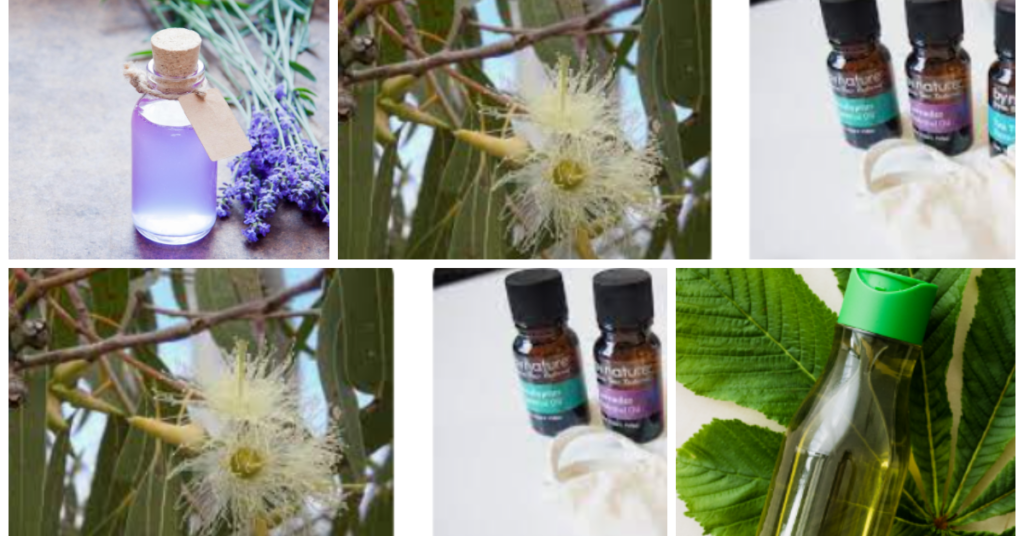
Lavender Oil: Lavender oil is like a breath of fresh air for your home. It has a pleasant, calming scent that not only makes your space smell lovely but also helps relax your mind. This relaxation can reduce stress, which is good for your overall well-being. When you’re less stressed, you might breathe more slowly and deeply, and this can improve the air quality in your home naturally.
Eucalyptus Oil: Eucalyptus oil is like a natural air cleanser. It has a crisp, invigorating aroma and contains compounds that can help fight off airborne germs. It’s especially handy when someone in your home is feeling under the weather. Just a few drops of eucalyptus oil in a diffuser can help freshen the air and make it easier to breathe.
Tea Tree Oil: Tea tree oil is a superstar when it comes to natural air cleaner. It has strong antibacterial and antifungal properties, which means it can help get rid of harmful microorganisms in the air. Using tea tree oil in a diffuser or as part of your cleaning routine can help keep the air cleaner acting like natural air purifier for home.
If you enjoy nice scents in your home, you might like an eucalyptus air purifier. This device designed to improve indoor air quality by using eucalyptus oil or eucalyptus-infused filters to filter and refresh the air in your home. Eucalyptus oil is known for its pleasant scent and natural properties that can help cleanse the air by neutralizing odors and potentially killing airborne bacteria and viruses.
Eucalyptus air purifiers typically work by drawing in the surrounding air, passing it through filters or pads infused with eucalyptus oil, and then releasing the purified and pleasantly scented air back into your living space. These purifiers are often used to create a fresh and invigorating atmosphere in your home, especially if you enjoy the refreshing fragrance of eucalyptus.
Using natural air purifier essential oil blends in your home can create a soothing atmosphere.
Reducing Pollutants for Cleaner Air
Reducing the use of synthetic chemicals and pollutants in your home can really help the air quality. Choose natural cleaning products and avoid air fresheners with fake smells and chemicals. It’s also good to keep your home clean and not too messy, because dust and dirt can make the air worse. Clean things like carpets, furniture and curtains often to stop allergens and bad stuff from building up.
One way to make your air cleaner is by using homeopathic air purifiers. These devices help take out things in the air that can make you sneeze or feel unwell. Another option is air deodorant bamboo charcoal, which acts like natural air purifiers and cleaners.
Other Natural Remedies for Fresher Air
Maintaining optimal humidity levels is important for preventing mold growth and reducing allergens. If it’s too damp, you might get mold, so using a machine called a dehumidifier can help in places like bathrooms and basements. But when it’s too dry, especially in dry seasons, using a humidifier can add some moisture to the air.
Beeswax candles can be a good option to enhance indoor air quality. When you light them, they release something called negative ions. These special ions can help cancel out the positive ions that are linked to things like allergens and pollutants floating in the air. So, not only do beeswax candles give a cozy and gentle light, but they also help keep the air around you fresher and cleaner.
Salt lamps are popular not just for their aesthetically pleasing glow but also they might be good for your health too. These lamps are made from special salt crystals found in the Himalayas. When you light them up, they release negative ions into the air. These little ions can stick to to airborne particles like dust and allergens, making them fall to the ground and making the air cleaner. Having a salt lamp in your home can make it feel more peaceful and also help improve the air you breathe.
Natural fiber air purifiers are an eco-friendly and effective way to filter the air in your home. Bags filled with activated charcoal or bamboo charcoal are getting more attention for their ability to soak up bad smells and pollutants. These porous bags can be placed in areas prone to odors, such as shoe racks, closets, and pet areas. They work by trapping unwanted particles, leaving your home smelling fresher and more welcoming.
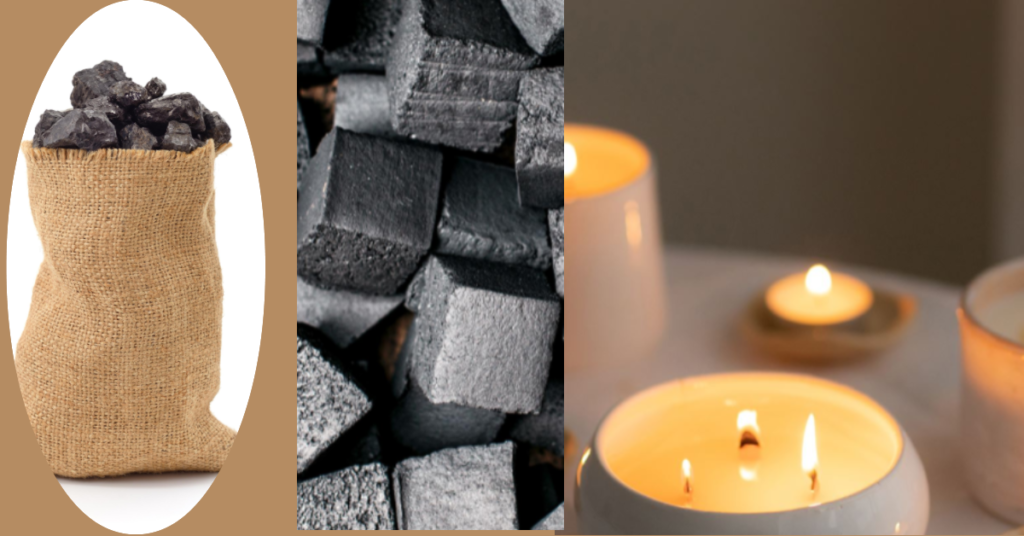
To sum things up, we’ve looked into the benefits of indoor plants as natural air purifiers and how some plants can clean out indoor pollutants. We’ve also used natural air purifiers DIY like bamboo charcoal to suck up dampness and bad smells. And we’ve found out how effective ventilation techniques that allow fresh air to circulate and dilute indoor pollutants.
We’ve also checked out aromatherapy with essential oils, making the air smell nice and reducing airborne bacteria and fungi. And we’ve seen why it’s smart to use natural cleaning products to reduce pollutants and keep our homes tidy to keep the air clean.
We’ve uncovered the significance of humidity control in preventing mold growth and respiratory discomfort. Beeswax candles and Salt lamps can be used for cleaner air. We’ve highlighted the effectiveness of natural fiber air purifiers like activated charcoal bags in eliminating unwanted odors and pollutants.
By doing these things, you’re making your place healthier for you and your family and you’re also helping the planet by being more eco-friendly. Remember, even small changes can make a big difference in the air you breathe and how you feel.
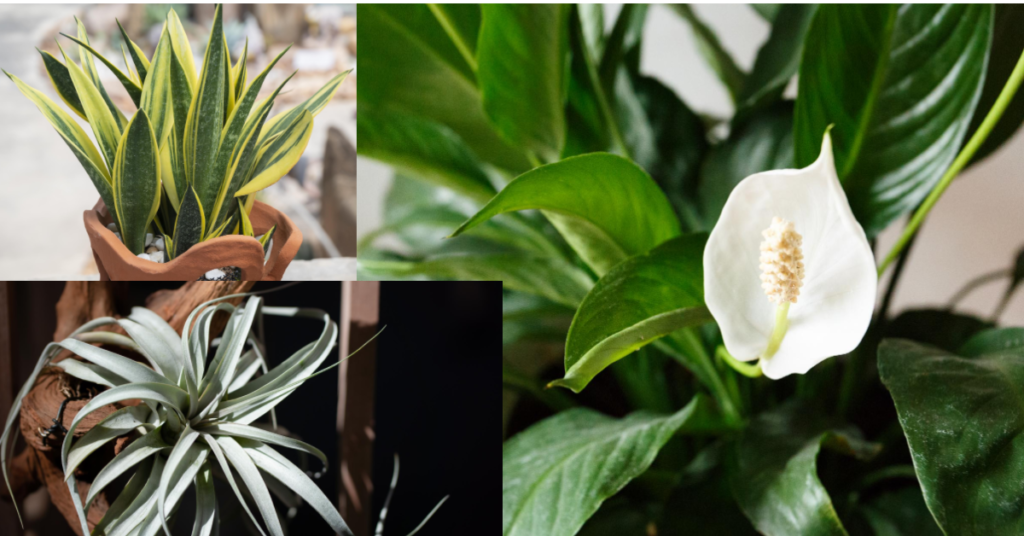
Frequently Asked Questions (FAQ)
Can indoor plants really improve indoor air quality?
Yes, indoor plants can help improve indoor air quality by absorbing common indoor pollutants and releasing oxygen.
How can essential oils improve the air in my home?
Essential oils have antimicrobial properties and can be used to create natural air fresheners that reduce airborne bacteria and fungi.
What is the role of bamboo charcoal in air purification?
Bamboo charcoal is a natural air purifier that absorbs moisture, odors and harmful particles, helping to maintain a cleaner environment.
How can I reduce indoor pollutants in my home?
You can reduce indoor pollutants by using natural cleaning products, avoiding synthetic chemicals and keeping your living space clean and clutter-free.
What is the significance of proper ventilation for indoor air quality?
Proper ventilation allows fresh air to circulate, diluting indoor pollutants and maintaining better indoor air quality.
Can you use regular charcoal to purify air?
Yes, you can use regular charcoal to purify the air. Charcoal has natural properties that can help absorb odors and some pollutants. You can place charcoal in a container or wrap it in a breathable cloth and put it in areas where you want to improve air quality.
How to purify air in the home without an air purifier?
You can purify the air at home without an air purifier by using natural methods. These include using plants like aloe vera and spider plants, opening windows for fresh air and using essential oils like eucalyptus or tea tree oil to add a pleasant scent and help clean the air.
How can I purify my home air naturally?
You can purify your home air naturally by using methods like keeping indoor plants, using essential oils and improving ventilation. These natural approaches help remove pollutants and create a healthier indoor environment.
What is the best natural purifier?
One of the best natural purifiers is indoor plants like spider plants, peace lilies and snake plants. They can help filter out common indoor pollutants and improve air quality.
What naturally filters air?
Plants naturally filter the air by absorbing pollutants and releasing oxygen. Some plants are especially good at this, like snake plants. natural air filters Plants like spider plants, peace lilies and snake plants are effective at filtering and enhancing air quality.
Which plant purifies the air the most?
The snake plant, also known as Sansevieria, is one of the most effective air-purifying plants. It’s known for removing toxins and improving indoor air quality.
How can I improve my indoor air quality without an air purifier?
You can improve indoor air quality without an air purifier by reducing sources of pollution, using indoor plants, ventilating your home and using natural air-cleaning methods like essential oils.
Do charcoal air purifiers work?
Yes, charcoal air purifiers can be effective at removing odors and some pollutants from the air. They work by adsorbing (not absorbing) impurities onto the charcoal’s surface.
How can I purify the air without an air purifier?
You can purify the air without an air purifier by using natural methods like plants, ventilation and essential oils. These methods help reduce pollutants and create a fresher atmosphere.
What works better than an air purifier?
While air purifiers are effective, improving ventilation, using plants, and keeping a clean home can work well alongside or even better than air purifiers in some cases.
Is a purifier good for lungs?
Air purifiers can help remove airborne particles that may irritate the lungs, making them beneficial for respiratory health, especially for individuals with allergies or asthma.
Are DIY air purifiers good?
DIY air purifiers can be effective if properly constructed. They often use materials like HEPA filters or activated charcoal to improve air quality.
Do we really need an air purifier at home?
Whether you need an air purifier at home depends on factors like your indoor air quality, health concerns and sensitivity to pollutants. They can be beneficial for many households.
Do air purifiers reduce dust?
Yes, air purifiers with HEPA filters can effectively reduce dust particles in the air, leading to a cleaner environment.
What does placing charcoal around the house do?
Placing charcoal around the house can help absorb odors and some indoor pollutants, making the air smell fresher.
Which is better, HEPA air purifier, or activated charcoal?
HEPA air purifiers are better at removing tiny particles like dust and allergens, while activated charcoal purifiers excel at adsorbing odors and some chemicals. The choice depends on your specific needs.
Which is better, bamboo charcoal, or activated charcoal?
Both bamboo charcoal and regular activated charcoal can be effective for air purification. The choice between them often comes down to personal preference.
Is eucalyptus oil good for air?
Eucalyptus oil is good for the air because it has a pleasant scent and natural properties that can help cleanse and refresh the indoor environment.
Does eucalyptus disinfect the air?
Eucalyptus oil has natural disinfectant properties that can help purify the air by potentially killing airborne bacteria and viruses.
Can essential oils purify the air?
Yes, essential oils like eucalyptus, tea tree oil and lavender can help purify the air by adding pleasant scents and potentially cleaning the air of impurities.
How many drops in the air purifier?
The number of drops of essential oil to use in an air purifier can vary. Usually, a few drops are sufficient to add fragrance and potentially purify the air.
How can I naturally purify the air in my house?
You can naturally purify the air in your house by using methods like essential oils, indoor plants and proper ventilation.
Is breathing in essential oils okay?
Breathing in essential oils in moderation is generally safe and can have pleasant effects. However, it’s important to use them as directed and avoid excessive inhalation.
Does Mint purify air?
Mint plants can help purify the air by absorbing pollutants and releasing oxygen. They also add a refreshing scent to your living space.
How long do essential oils stay in the air?
The duration of essential oils staying in the air can vary but is usually a few hours. It depends on factors like the type of oil, diffusion method and room ventilation.
DheerajSonwane is a dedicated writer with expertise in air purification technologies. He focuses on providing well-researched content to help readers improve indoor air quality in homes and businesses. As the lead writer at AirPurifierMaster.com, Dheeraj offers practical advice his insightful reviews guide individuals in choosing the best air purifiers for their needs.

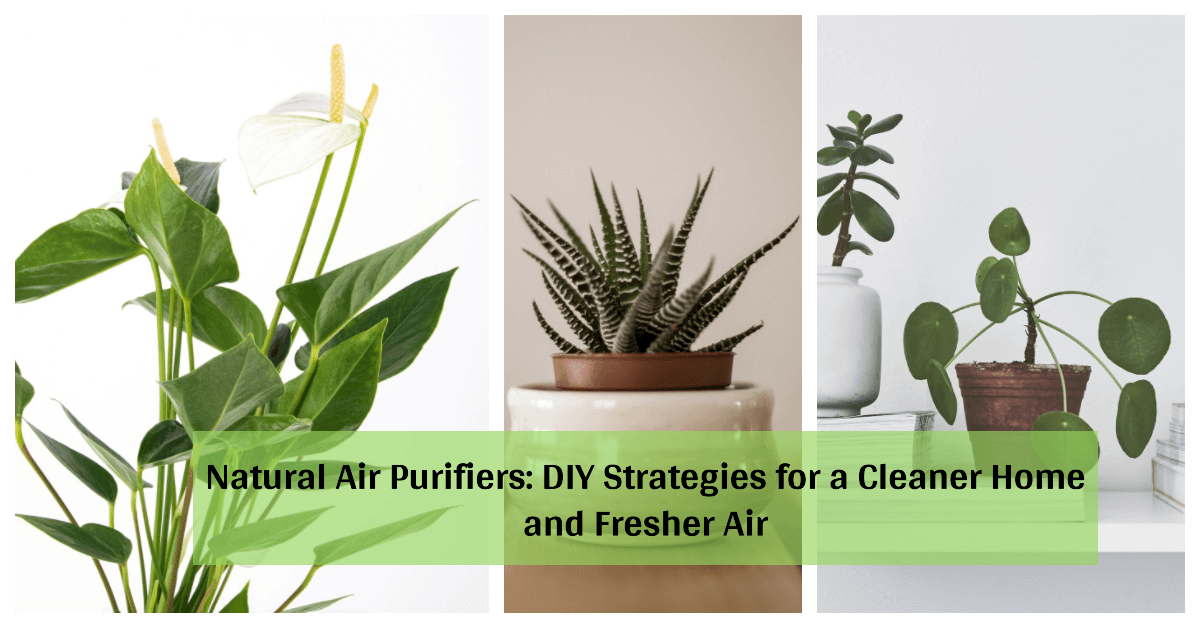
4 thoughts on “Natural Air Purifiers: DIY Strategies for a Cleaner Home and Fresher Air”